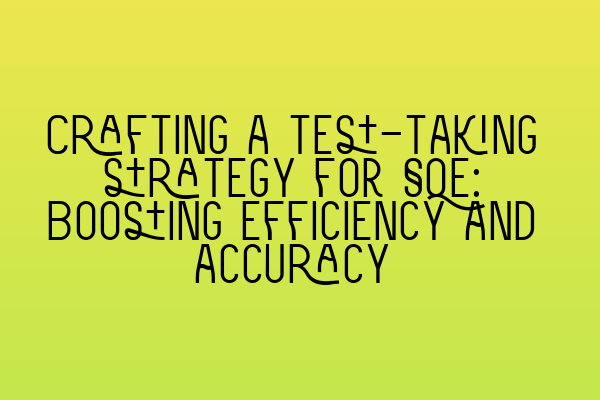**Crafting a Test-Taking Strategy for SQE: Boosting Efficiency and Accuracy**
Are you preparing to take the Solicitors Qualifying Exam (SQE)? As you delve into the vast syllabus and extensive study materials, it’s crucial to develop a test-taking strategy that will help you enhance your efficiency and accuracy. In this blog post, we will explore some effective techniques and tips to maximize your performance on the SQE. So, let’s dive in!
**1. Understand the Exam Structure and Content:**
Before delving into your test preparation, it’s essential to have a solid grasp of the exam structure and content. Familiarize yourself with the different sections, such as Functioning Legal Knowledge (FLK) and Practical Legal Skills (PLS). Develop a clear understanding of the topics covered in each section, ensuring you allocate appropriate study time to each one. This knowledge will enable you to create a targeted revision plan tailored to your strengths and weaknesses.
**2. Utilize Effective Time Management Techniques:**
One of the most critical aspects of test-taking is managing your time efficiently. Practice working under time constraints by setting realistic time limits for each question or section during your mock exams. Additionally, employ helpful time management techniques such as the Pomodoro Technique, where you work for a specific period, usually 25 minutes, followed by short breaks. This method will help you maintain focus and prevent burnout.
**3. Develop a Systematic Approach to Answering Questions:**
Having a systematic approach to answering questions can significantly improve your accuracy and speed. Start by carefully reading each question, underlining keywords, and identifying the main issue or problem. Then, create a framework for your answer, organizing key points or legal principles you will address. Remember to reference relevant statutes, cases, or regulations in your response to demonstrate your depth of knowledge.
**4. Practice Active Recall and Spaced Repetition:**
To ensure long-term retention of knowledge, incorporate active recall and spaced repetition into your study routine. Active recall involves retrieving information from memory rather than simply re-reading notes or materials. Engage in practice questions, flashcards, or quizzes that require you to actively retrieve information. Additionally, spaced repetition involves reviewing information at regular intervals over time to reinforce learning. Utilize online platforms or apps that provide spaced repetition features to enhance your retention.
**5. Strengthen Analytical Skills with Real-World Examples:**
The SQE requires a strong ability to apply legal principles to real-world scenarios. Enhance your analytical skills by seeking out relevant case studies, legal articles, and practical examples. By familiarizing yourself with actual cases or legal issues, you will develop a deeper understanding of how to apply the law in practical situations. Invest time in reading related articles on topics such as “Legal Considerations in Residential Leases: Essential Insights for Solicitors”, “Freehold vs Leasehold: Understanding the Differences”, “Understanding Planning Permission and Land Use: Key Considerations for Legal Professionals”, and “Land Charges: Understanding and Managing Encumbrances.” These articles will provide you with valuable insights and further consolidate your knowledge.
**6. Take Advantage of Mock Exams and Past Papers:**
Mock exams and past papers are invaluable resources for SQE preparation. They allow you to simulate the exam environment and familiarize yourself with the question formats and requirements. By practicing with past papers, you will identify patterns, gain confidence in your exam technique, and bridge any knowledge gaps. Evaluate your performance critically, analyzing your strengths and weaknesses, and adjust your study plan accordingly.
**7. Seek Support and Collaboration:**
Studying for the SQE can sometimes feel overwhelming. Remember that you are not alone on this journey. Seek support from study groups, online forums, or professional communities where you can discuss and share ideas, strategies, and resources. Collaborating with others can provide a fresh perspective, help clarify difficult concepts, and motivate you to stay focused on your goals.
**Conclusion:**
Crafting a test-taking strategy is crucial in optimizing your performance on the SQE. By understanding the exam structure, managing your time effectively, adopting a systematic approach, incorporating active recall and spaced repetition, strengthening analytical skills, utilizing mock exams and past papers, and seeking support and collaboration, you can enhance both efficiency and accuracy in your preparation. Remember, stay committed, maintain a positive mindset, and put your best foot forward. Good luck on your path to becoming a qualified solicitor!
**Related Articles:**
– [Legal Considerations in Residential Leases: Essential Insights for Solicitors](https://property-practice-law-sqe.co.uk/legal-considerations-in-residential-leases-essential-insights-for-solicitors/)
– [Freehold vs Leasehold: Understanding the Differences](https://property-practice-law-sqe.co.uk/freehold-vs-leasehold-understanding-the-differences/)
– [Understanding Planning Permission and Land Use: Key Considerations for Legal Professionals](https://property-practice-law-sqe.co.uk/understanding-planning-permission-and-land-use-key-considerations-for-legal-professionals/)
– [Land Charges: Understanding and Managing Encumbrances](https://property-practice-law-sqe.co.uk/land-charges-understanding-and-managing-encumbrances/)
– [MCQ Strategies for SQE Property Practice: Tips for Exam Success](https://property-practice-law-sqe.co.uk/mcq-strategies-for-sqe-property-practice-tips-for-exam-success/)

Leave a Reply